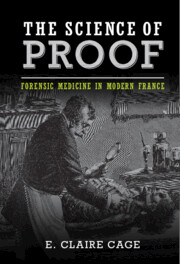Book contents
- The Science of Proof
- Studies in Legal History
- The Science of Proof
- Copyright page
- Contents
- Figures
- Acknowledgments
- Introduction
- 1 The Science of Death
- 2 Poisoning and the Problem of Proof
- 3 Deception and Detection
- 4 Reproductive Bodies and Crimes
- 5 The Forensics of Sexual Crimes against Children
- Conclusion and Epilogue
- Notes
- Bibliography
- Index
1 - The Science of Death
Published online by Cambridge University Press: 25 August 2022
- The Science of Proof
- Studies in Legal History
- The Science of Proof
- Copyright page
- Contents
- Figures
- Acknowledgments
- Introduction
- 1 The Science of Death
- 2 Poisoning and the Problem of Proof
- 3 Deception and Detection
- 4 Reproductive Bodies and Crimes
- 5 The Forensics of Sexual Crimes against Children
- Conclusion and Epilogue
- Notes
- Bibliography
- Index
Summary
Death investigation was a central aspect of forensic medicine. However, doctors struggled with uncertainty in defining and evaluating signs of death, at the same time as popular fears of premature burial abounded. Moreover, they faced considerable difficulties in distinguishing between homicides, suicides, and natural or accidental deaths and in determining the cause of death. Anxiety about insufficiently trained and incompetent practitioners who performed medicolegal duties that exceeded the limits of their knowledge and skills fueled demands for medicolegal reform. As medicolegal expertise played a more and more decisive role in criminal investigations and prosecutions, flawed forensic expertise became an increasingly salient problem that sparked ongoing debates about possible structural solutions.
- Type
- Chapter
- Information
- The Science of ProofForensic Medicine in Modern France, pp. 12 - 44Publisher: Cambridge University PressPrint publication year: 2022

